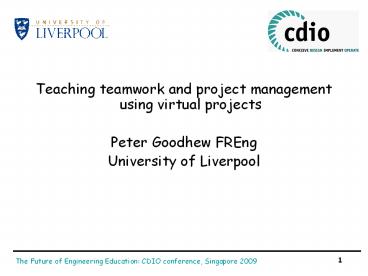Teaching teamwork and project management using virtual projects
1 / 14
Title:
Teaching teamwork and project management using virtual projects
Description:
Teaching teamwork and project management using virtual projects Peter Goodhew FREng University of Liverpool * The teams Mixed disciplines (first run), same discipline ... – PowerPoint PPT presentation
Number of Views:4
Avg rating:3.0/5.0
Title: Teaching teamwork and project management using virtual projects
1
- Teaching teamwork and project management using
virtual projects - Peter Goodhew FREng
- University of Liverpool
2
Some background
- For all Engineering programmes at Liverpool
- Management is taught via one module each year
- 2nd year students receive MNGT202 Project and
Risk Management - Until 2006/7 this was taught via 18 lectures and
a conventional exam - The class is typically 250 students
3
The problems
- It was boring for the students
- It was boring for the lecturer
- It was totally inactive
- . But the students need this topic for
employment, and for projects within their
programme.
4
The solution - 1
- Three additional learning outcomes
- Use of Microsoft Project
- Ability to work in a team
- Ability to work to deadlines
5
The solution - 2
- Virtual projects
- Accessible to every student
- Five intermediate team deliverables every 2
weeks - Reduced number of lectures (now 6 or 7)
- Hard deadlines (one minute late no marks)
- All delivered via VLE
- MCQ exam
6
The bargain
- Presented to the students
- Deadlines are firm, no excuses
- Deliverables will be marked in 2 days and
feedback given at next lecture - All team members take turn as chairman (PM) and
secretary - Team minutes assessed
- In case of problems, if it is not recorded in the
team meeting minutes, we do nothing about it!
7
The teams
- Mixed disciplines (first run), same discipline
(second run) - 5 persons (first run), 6 persons (second run)
- Teams determined by me (random but no
all-same-minority or all-female teams)
8
The projects
- Setting up a restaurant, or
- Providing a building for a third-world village
- Every team has different data
- During every project a change order is issued (no
warning of this!)
9
The tasks
- SMART objective and SWOT analysis
- Work Breakdown Structure and Gantt chart
- Change order so revise plan, critical path, slack
- Stakeholders, risk register, mitigation
- Depreciation, discounted cash flow and overhead
absorption calculations - (MSc only) requirements document, reflective
analysis of process and effectiveness of team - An on-line test in similar MCQ format to exam
10
Assessment
- 60 on MCQ exam
- 40 on tasks (5 x 6 10 for on-line test)
- No peer marking or moderation of marks (a pity,
but ) - Coarse (3-point) mark scale for each part of each
task - Markers (2 or 3) switched among project teams
11
How it went
- It was hard work! (especially marking 60 teams in
2 days, five times) - Students liked it
- 07/08 87 enjoyed VP
- 08/09 94 enjoyed VP
- Marks went up
2002 2003 2004 2005 2006 2007 2008 2009
Class ave 62 57 60 55 61 64 71 71
12
Some comments
- It illustrated to me that even a minor project
(in our case was the village barn) can be complex
and highlights the importance of planning,
management and control to the success of the
project . - I just realised that management is not easy as I
thought. - I think use of VITAL was exceptional and that
the team projects were an interesting and
practical way of learning. - The virtual projects were useful because it
enabled us to apply what we learnt in the
lectures to a real-life situation. It also
enabled us to build on our team working skills
and allowed us to use industry-standard tools for
project management
13
Changes in response to feedback
- No mixed discipline teams (a pity!).
- Smaller class size for lectures (120 vs 300).
- Each lecture videoed and put on VLE.
- Shared teaching (Goodhew plus Murphy)
14
Conclusions
- VPs delivered benefit to students
- Dull subject which appeared irrelevant to many
students is made both relevant and lively - It took 5 TA-months to prepare VPs
- Matt and I enjoyed it































